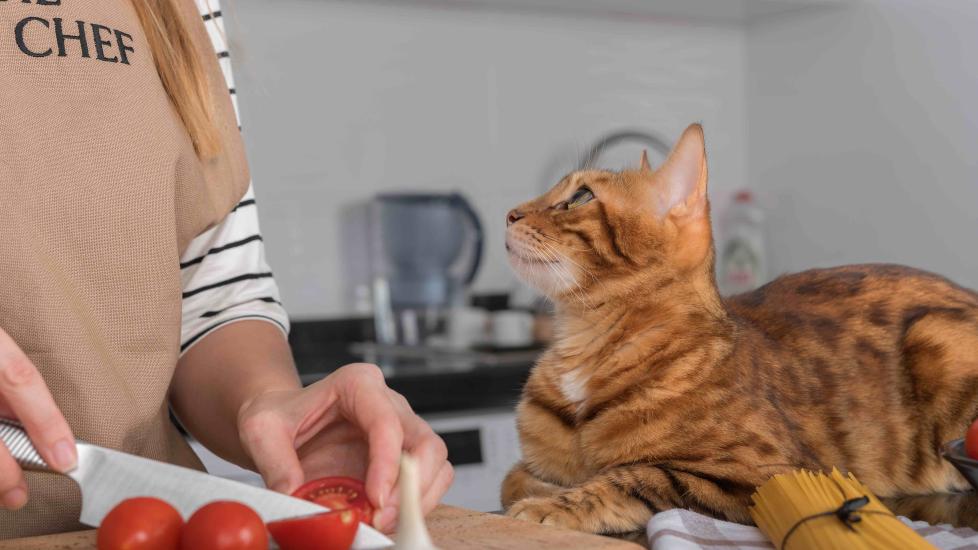Can Cats Eat Tomatoes?
Adobe Stock/Amerigo_images
Tomatoes are a common staple in the kitchen. And while we don’t think of our feline friends being particularly interested in fruits, your cat might show some curiosity about that tomato in your salad or on your sandwich. But can cats eat tomatoes? Or are tomatoes toxic to cats? The answer is a little nuanced.
Are Tomatoes Good for Cats?
Ripe tomatoes are not toxic to cats. However, cats are considered obligate carnivores, meaning that the bulk of their nutrition needs to be derived from animal meat products. As such, non-meat foods provide relatively little nutrition to cats.
So, even though tomatoes are packed full of vitamin C, folate, potassium, and vitamin K1, the amount your kitty would need to add any significant benefit to their diet is well above the amount their gastrointestinal tract is designed to handle. Therefore, while ripe tomato fruit is safe for cats, it’s also not recommended for them to eat.
Can Cats Eat Tomato Plants? Or Are Tomato Plants Toxic to Cats?
While ripe tomato fruits are safe for cats to eat, tomato plants and unripe fruit are not. The leaves and stems of the tomato plant contain a chemical called solanine, which is toxic to cats, dogs, and horses.
Ingesting solanine can trigger:
-
Dilated pupils
-
Slowed heart rate
Eating even a small amount of a tomato plant can trigger clinical signs. If you catch your cat nibbling at the tomato plants in your garden, contact your veterinarian.
Although tomato toxicity is not normally fatal, the signs it can cause are often quite uncomfortable to the cat and should be addressed quickly. Contact your veterinarian if you know that your cat has been exposed to a tomato plant—especially if you notice any drooling or nausea, which are typically the first signs of toxicity. If your cat begins to appear depressed or develop dilated pupils, this is a medical emergency.
While ripe tomato fruits are safe for cats to eat, tomato plants and unripe fruit are not. The leaves and stems of the tomato plant contain a chemical called solanine, which is toxic to cats, dogs, and horses.
What Tomato Products Are OK for Cats?
Aa a rule, cats and tomatoes don’t mix. No tomato products will improve a kitty’s diet, and the fruit only holds the potential for causing gastrointestinal (GI) upset. Tomatoes are simply best avoided.
However, if your feline friend seems to have a liking for tomatoes, very small amounts of plain, ripe tomato are safe for them. However, some tomato products contain added herbs, onions, garlic, sugars, or other ingredients that may be toxic for cats and should be avoided.
Can Cats Eat Tomato Sauce?
Tomato sauce is on the no-no list for cats. Unfortunately, tomato sauces usually contain additional ingredients that can be harmful for cats, including oregano, garlic, onion, sugar, and salt. Although a tiny bit of sauce on a piece of stolen meat is unlikely to be harmful, don’t let your cat help themselves to your plate of spaghetti.
Can Cats Eat Tomato Soup?
Just like tomato sauce, tomato soup commonly has added ingredients, especially herbs and spices such as oregano, garlic, onion, sugar, and salt. These are generally dose-dependent toxins, meaning the more the cat eats, the more likely there will be a problem. It’s safer to just avoid feeding cats these empty calories that might also result in illness.
What To Feed Your Cat Instead
Because they are obligate carnivores, the best “people foods” for your cat is lean, plain, well-cooked meat. Some go-to options include:
Make sure the meat is thoroughly cooked and human grade, meaning there are no bones or scales. In small amounts, these are considered healthy snacks, and your kitty will likely thank you for them!
Remember that any treat you give your cat, including cooked meat, should make up no more than 10% of your cat’s daily calories. The other 90% should come from their well-balanced cat food. Always talk to your veterinarian before adding any new food to your cat’s food bowl.
